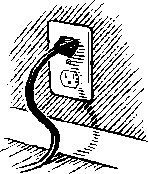My literary agent directed me to an article in the New York Times this past week, Plug-In Cars Pose Riddle for E.P.A., which discussed how to measure the mileage of these cars. First, there are no gallons becase there is no gasoline to burn in a plug in electric car. So let's try to sort this out. We can make them equivalent to compare them.
The plug-in Nissan Leaf was described in the NYT article, so I'd like to use this vehicle as an example. Let's assume it takes 50 kilowatt-hours to charge this car during an 8 hour overnight charge. The car is designed to go an average of 100 miles on that charge, but speed, acceleration, weather, using the heater or the air conditioner, as well as the other options, will affect the range.
So how much energy is this and how does it equate to miles per gallon? 50 kilowatt-hours will require about 510,000 Btus (10,200 Btus/KwH) to be burned at a far-off power plant to deliver that electricity to the Leaf's charger though an electrical outlet. That's the amount of energy in about 4.4 gallons of gasoline. If you travel 100 miles, you've received 22.7 miles per gallon. Not much different than a gasoline powered vehicle, with one exception: The gasoline powered vehicle will take you 400 miles on a tank of gas, rather than 100 miles on a charge.
What about cost? Residential electricity prices can range from around 6 cents per kilowatt-hour in Idaho to 30 cents in Hawaii. The current average price of gasoline in the U.S. is about $2.82 per gallon. This is a little difficult because the price of gasoline across the U.S. is in a tighter range than electricity. Let's assume the average price of electricity in the U.S. is about 12 cents per kilowatt-hour. 4.4 gallons of gasoline will cost you about $12.41. And 50 kilowatt-hours of electricity will cost you only about $6.00, on average, or $3.00 in Idaho and $15.00 in Hawaii.
Why? Why is an electric car, of similar energy efficiency to a gasoline driven internal combustion engine, less costly to run? It's because power plant fuel, coal, natural gas and uranium, are much less expensive on the basis of cost per million Btus than the gasoline you and I purchase at the pump. In a recent post, I reported that at $3.00 per gallon, gasoline cost $26.00 per million Btus. Currently natural gas is $3.42 per MMBtu at the well head and coal will cost an average of $2.26 per MMBtu in 2010 at the mine mouth. One has to add the cost of transport to make the comparison, however, it will not increase the cost by an order of magnitude.
Subscribe to:
Post Comments (Atom)




No comments:
Post a Comment